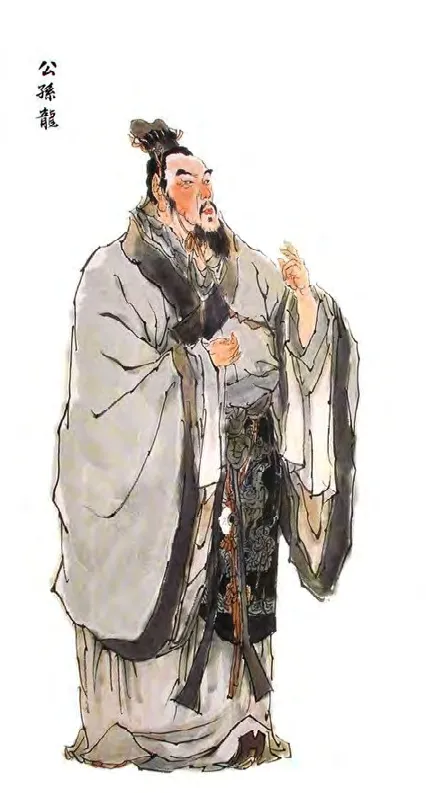Over-interpretation
2019-07-20ByWangChonglyu
By Wang Chonglyu
Once I read online a conversation between author Li Ao and his son Li Kan:
Father: Go buy me a soda.
Son: Coke or Sprite?
Father: Coke.
Son: Can or bottle?
Father: Bottle.
Son: Sugar-free or regular?
Father: Regular.
Son: 500ml or 1000ml?
Father: You’re so annoying, forget it! Just get me some water.
Son: Mineral or filtered?
Father: Mineral.
Son: Iced or room temperature?
Father: (Angry) If you keep this up, see that I don’t take a broom to you.
Son: Plastic or bamboo?
Father: You filthy creature!
Son: Pig or ox?
Father: (Panting) I’ll…I’m going to spit blood in anger because of you…blood!
Son: Should I grab the garbage can or carry you to the bathroom?

公孙龙(前320年-前250年),中国古代逻辑学家,名家代表人物,以“白马非马”论名闻天下。Gongsun Long (320-250 BC) was a logician in ancient China and a representative figure of the School of Names. Gongsun Long is famous for the discourse in which he discusses why “a white horse is not a horse.”
Father: Let me die!
Son: Buried or cremated?
Father: The cuss? You’re really trying to kill me, aren’t you?
Something that is originally very simple becomes unexpectedly the butt of a joke sometimes, because of constant inquiry trying to get to the root of matters.
This reminded me of an anecdote that Mr. Feng Youlan, a Chinese philosopher, once told.
One day, Logician Gongsun Long was about to travel and he asked one of his pupils to pull a horse for him. His pupil went but returned empty-handed, saying, “There are no horses in the stables, apart from a white horse.”
Gongsun Long asked him to lead the white horse out.
After a while the pupil returned again, reporting, “There’s no white horse anymore, there is only a skinny white horse.”
Gongsun Long, increasingly impatient, said, “Moron! Bring the skinny white horse out then.”
过度阐释
文/王充闾
从网上看到作家李敖和儿子李戡的一段对话——
父:你去买瓶汽水。
子:是可乐还是雪碧?
父:可乐。
子:铁罐的还是瓶装的?
父:瓶装的。
子:没糖的还是普通的?
父:普通的。
子:500毫升的还是1000毫升的?
父:你好烦!算了,水就可以啦。
子:矿泉水还是过滤水?
父:矿泉水。
子:冰的还是不冰的?
父:(生气了)你再啰唆,看我拿扫帚打你。
子:是拿塑胶的,还是竹子的?
父:你这个畜生!
子:像猪还是像牛?
父:(气喘)我……我会被你……你气得吐血……血啦!
子:要拿垃圾桶,还是扶你到厕所?
父:我死了算了。
子:你要土葬,还是火葬?
父:他妈的!你是存心气死老爹了……
原本是十分简单的事,由于一味地寻根究底,最后竟闹出了一场笑话。
这使我联想到冯友兰先生讲的一个趣事——
有一天,公孙龙要出门旅行,叫弟子去牵马。弟子去了,结果空手而回,说:“先生,马厩里没有马,只有白马。”
公孙龙就让他把白马牵来。
隔了一会儿,弟子又来汇报:“白马也没了,只有瘦白马。”
公孙龙非常不耐烦地说:“呆子!那就牵瘦白马来。”
可是,死心眼儿的弟子还是没领会,又来报告:“师父,我只看见一匹瘸腿的瘦白马。”
公孙龙火了,揪住弟子的耳朵来到马厩,指着马说:“就是这匹马,你要认清了!”
其实,这并不是弟子呆,而是公孙龙自讨尴尬,他把名词慷慨地赠与共相世界,而留给实际世界的,只剩下可怜的指示代词“这”和“那”了。偏偏遇上这个“老实巴交”的听话弟子,忠实地按照他的指示办事,最后陷入过度阐释的窘境。
这种过度索解的事例,我碰上过一次。
一年,在辽宁电视台文艺晚会上,省内的知名人士纷纷到会,堪称“名流荟萃,冠盖如云”,正在沈阳演出的京剧表演艺术家李胜素女士也应邀出席了。
节目进行过程中,惯于接茬儿、逗趣儿、说废话的主持人一时雅兴大发,出人意料地即兴提出一个有趣的问题:“请各位嘉宾分析、解答:李胜素女士的名字——‘胜素’二字有什么含义?”
主持人话音一落,坐在前两排的几位名流当即举手响应。
一位从事艺术教学的老师说:“‘素’者,质朴、素雅之谓也,不施粉黛,明慧天成,达到了美的极致;‘胜素’,就是取胜之道,在于抱朴守素。”
一位专门从事国学研究的学者站起来讲:“这个‘素’可大有讲究。一是纯白,纯白的质地上施以彩绘,叫作‘素以为绚’,这是见诸《论语》的;二是属于根本性质的事物,比如质素、元素;三是安于现在,《中庸》里说:‘君子素其位而行。’朱熹解释说,安于现在所居之位,为其所当为。‘胜素’则表明,不能安于现状,必须积极进取。”
But, his stubborn pupil still didn’t get the point. He came back again, reporting, “Master, I only see a crippled, skinny white horse.”
Gongsun Long became agitated. He grabbed the pupil by the ear and led him to the stables. Pointing at the horse, he said, “It is this horse. You get it!”
It is not that his pupil was actually stupid but that Gongsun Long was asking to get himself embarrassed. He generously bestowed all of his nouns to the world of universality while saving pitiable pronouns like “this” and “that” for the actual concrete world. It was just that he happened to meet an honest, obedient pupil who loyally carried out his orders. In the end he fell into the plight of overinterpretation.
I too have encountered an instance of over-explanation. One year, on Liaoning TV’s Evening Gala, celebrities came from all over the country. It was a “gathering of high officials and distinguished guests.” Ms. Li Shengsu, a Peking Opera artist who was currently performing in Shenyang, was invited to the party. One of the presenters who was good at chiming in, getting a laugh and talking nonsense, unexpectedly asked an interesting question: “I invite all our honored guests to analyze and explain: Ms. Li Shengsu’s name. What is the meaning of her name Shengsu?”
As soon as the host finished speaking, a number of attendees in the front rows raised their hands to answer the question.
An art teacher said, “Su is unaffected, simple but elegant. Without the application of cosmetics but with natural intelligence that reaches the pinnacle of beauty. Shengsu means a victory in life, staying true to one’s nature and maintaining one’s aspirations.”
A scholar who specializes in Chinese traditional culture stood up and began speaking, “Chinese character Su has many connotations. The first is that it stands for purity, which resembles the colorful paint on a white texture, ‘the plain property for the colors,’ as it is put in The Analects. Secondly, it is the fundamental essence of any objects; that is why it can be found in words like zhisu (meaing quality) and yuansu (meaning element). Thirdly, it means the contentment with the present situation. The Golden Mean states, ‘The superior man does what is proper to the station in which he is.’ Zhu Xi’s commentary states that this means being content with your current position in life and doing the things that you ought to do.” This is to say, Shengsu means being discontent with the status quo and desiring to, instead, be proactive.”
A young female writer spoke rather quickly, “Su, can be understood as clean and plain. Eileen Chang said, ‘The drawback of aestheticism is not in its beauty, but in that its beauty doesn’t have any backdrop.’ ‘Only from describing modern people’s resourcefulness and decoration can I set off the plainness of life.’‘I use the plainness and security in life as a backdrop to describe life’s jubilance. Without this background, life’s radiance is nothing but suds. Many strong works of art only bring excitement to people, but not enlightenment. Failure comes from being unable to master the use of this type of backdrop.’ This ‘simple backdrop’ is constituted from the scrapes and scratches of everyday life. It is the unique appeal of Eileen Chang’s writings. The name Shengsu is showing reverence for this kind of ‘plainness,’ exuding this philosophy and pursuit for life.”
There were still people with raised hands but the host made a gesture to stop. He probably figured out that they had already gotten as much depth out of analyzing her name as they possibly could. He respectfully walked over to Ms. Li Shengsu and asked, “Please, give us an interpretation of your name. Which great artist gave you such a profound and refined name?”
一位年轻的女作家以颇快的语速讲:“素,可以理解为‘朴素的底子’。张爱玲说:‘唯美派的缺点不在于它的美,而在于它的美没有底子。’‘我只能从描写现代人机智与装饰中去衬出人生朴素的底子。’‘以人生的安稳做底子来描写人生的飞扬。没有这底子,飞扬只能是浮沫。许多强有力的作品只能予人以兴奋,不能予人以启示,就是失败在不知道把握这底子。’这‘朴素的底子’就是日常生活的痕迹,就是张爱玲文字中的独特韵味。‘胜素’就是崇尚这种‘朴素的底子’,体现了一种生命哲学、人生追求。”
台下仍然有人举手,但主持人做了一个“停止”的手势,他可能觉得分析的深度够了,便恭敬地走到李胜素女士面前,说:“请您自己谈谈对名字的认识,是哪位艺术大家给您起了这么一个高深、儒雅的名字?”
只见李女士站起身来,谦虚而娴雅地给观众鞠个躬,说:“感谢各位对我的高看。其实,我的名字没有那么多的讲究。我是河北柏乡人,在我们老家那里,女孩小名都带个‘小’字。我出生之后,奶奶抱起来看看,说:‘长得很素气,就叫小素子吧。’我奶奶一个大字不识,她哪里懂得那么多学问。”
一番话闹得全场哗然,热烈的掌声倒使几位考据家和名师倍感难堪。
(摘自《秋窗漫笔》万卷出版公司)

Ms. Li stood up,elegantly and modestly bowed to the audience, saying, “I would like to thank everyone for thinking so highly of me. To tell you the truth, there isn’t much sophistication to my name. I’m from Baixiang County in Hebei where all the girls’ nicknames must have the character ‘little.’ After I was born, my grandma held me and said, ‘She’s a neat-looking girl. Let’s just call her Little Su then.’ My grandma was illiterate, how could she be that educated?”
The whole place was in a commotion which was soon followed by warm applause, leaving those critics and celebrities feeling greatly embarrassed.
(From Notes by the Autumn Window, Volumes Publishing Company. Translation: Sam Bowden)
